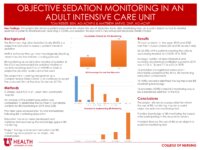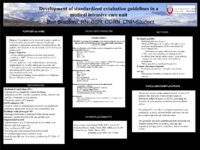The Graduate Nursing Project collection includes Doctor of Nursing Practice (DNP) Scholarly Projects and Master's students' non-thesis projects submitted as part of program requirements.
TO
1 - 25 of 10
| Title | Creator | Date | Description | Relation Is Part Of | ||
|---|---|---|---|---|---|---|
| 1 |
 |
Objective Sedation Monitoring in an Adult Intensive Care Unit | Rieber, Tom; Jarvis, Matthew | 2021 | POSTER | Graduate Nursing Project, Doctor of Nursing Practice, DNP, Acute Care, Poster |
| 2 |
 |
Development of Standardized Extubation Guidelines in a Medical Intensive Care Unit | Bradford, Ben | 2017 | POSTER | Graduate Nursing Project, Doctor of Nursing Practice, DNP |
| 3 |
 |
Proposal for Implementation of a Hospital Elder Life Program for the Prevention of Delirium at a Veteran's Administrative Hospital in the Intermountain West | Coates, Catherine | 2016 | This scholarly project was the development and presentation of a business plan proposing the implementation of the Hospital Elder Life Program (HELP), for the prevention of delirium, in hospitalized veterans aged 65 years and older. The business plan presented data specific to the Veterans Administr... | Graduate Nursing Project, Doctor of Nursing Practice, DNP |
| 4 |
 |
Improving Sedation in the ICU by Adhering to National Guidelines and Recommendations | England, Lorraine D. | 2016 | Over five million individuals are admitted to a critical care unit in the United States each year. The number one diagnosis for admission is respiratory failure. Something as simple as decreasing the amount of medication a patient receives can improve outcomes for this large and vulnerable patient p... | Graduate Nursing Project, Doctor of Nursing Practice, DNP |
| 5 |
 |
A Clinical Practice Guideline for the Recognition, Diagnosis, and Management of Neonatal Delirium | Schulte, Krista | 2018 | Purpose. The objective of this project was to create a clinical practice guideline (CPG) in order to standardize the assessment and treatment of neonatal delirium in a newborn intensive care unit (NICU) environment. Methods. An evidence-based CPG was developed using literature pertaining to pediatri... | Graduate Nursing Project, Doctor of Nursing Practice, DNP |
| 6 |
 |
Screening of Patients at Risk for Post-Intensive Care Unit Post-Traumatic Stress Disorder | Dayton, Kali | 2018 | Many patients discharged from the intensive care unit (ICU) setting experience post-ICU post-traumatic stress disorder (PTSD) for up to a year after discharge. With the right knowledge and screening tools ICU staff can minimize the frequency and severity of post-ICU PTSD. The focus of this project w... | Graduate Nursing Project, Doctor of Nursing Practice, DNP |
| 7 |
 |
Effectiveness of an Educational Intervention to Increase ICU Nurses' Delirium Knowledge and Documentation of the CAM-ICU Tool | Lathem, Mallory | 2019 | Delirium leads to increased intensive care unit (ICU) patient morbidity and mortality, longer length of stay, and increased healthcare costs. Undetected delirium and unmanaged risk factors that contribute to the development of delirium are a significant issue in ICUs. The purpose of this project was... | Graduate Nursing Project, Doctor of Nursing Practice, DNP |
| 8 |
 |
Delirium Management in the Intensive Care Unit | Jarvis, Matthew | 2017 | Delirium is a cognitive impairment that includes an altered level of consciousness, disorganized thinking and inattention. Hospitalized patients, especially those critically ill, are at an increased risk for developing acute delirium during the hospital stay. Delirium in the intensive care unit (ICU... | Graduate Nursing Project, Doctor of Nursing Practice, DNP |
| 9 |
 |
Implementing Sedation Vacation, Spontaneous Breathing Trial, and Confusion Assessment Method in a Medical Intensive Care Unit | Bryden, Allyson | 2020 | Background: According to the Society of Critical Care Medicine, more than 5 million Americans are admitted to intensive care units (ICUs) annually. Of these admissions, 20%-40% require mechanical ventilation. Patients on mechanical ventilation usually receive continuous sedation medication. Such sed... | Graduate Nursing Project, Doctor of Nursing Practice, DNP, Acute Care |
| 10 |
 |
Development of Standardized Extubation Guidelines in a Medical Intensive Care Unit | Bradford, Ben | 2017 | Oral endotracheal tube (OETT) intubation is a medical intervention for critically ill medical patients who have lost the ability to maintain their airway, suffer respiratory failure, or have deteriorated clinically to the point at which loss of the ability to protect their airway is imminent. For th... | Graduate Nursing Project, Doctor of Nursing Practice, DNP |
1 - 25 of 10
